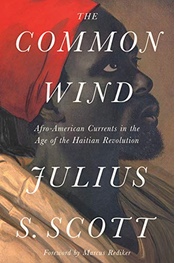3 decades after it was finished Julius Scott’s highly praised slavery book is finally published!
 The manuscript was almost published a couple of times. One editor expressed enthusiasm, then abruptly passed. Oxford University Press offered the author — Julius S. Scott, a young historian who had just completed his doctorate at Duke — a contract, along with suggestions for significant revisions. Scott could have made the changes, argued with Oxford, or taken his chances with another press. Instead he set it aside. [Scott is a professor of AfroAmerican and African Studies at the University of Michigan.]
The manuscript was almost published a couple of times. One editor expressed enthusiasm, then abruptly passed. Oxford University Press offered the author — Julius S. Scott, a young historian who had just completed his doctorate at Duke — a contract, along with suggestions for significant revisions. Scott could have made the changes, argued with Oxford, or taken his chances with another press. Instead he set it aside. [Scott is a professor of AfroAmerican and African Studies at the University of Michigan.]
And there it stayed for three decades. The Common Wind: Afro-American Currents in the Age of the Haitian Revolution, which traces networks of communication among slaves and sailors in the Caribbean and beyond, was completed in 1987, and it will be published for the first time this month by Verso.
To be clear, this is not the story of a publisher’s dusting off an obscure gem: The Common Wind has long been revered by historians. Over the years, it’s been passed around, first in photocopies and later as a PDF. In 2008 the University of Michigan at Ann Arbor held a conference inspired by The Common Wind. It’s made its way onto required-reading lists and been cited hundreds of times. Not bad for an unpublished book in need of revision.
Among The Common Wind’s boosters is Marcus Rediker, a professor of history at the University of Pittsburgh and author of The Slave Ship: A Human History (Viking, 2007). Rediker heard about The Common Wind when it was still a dissertation in progress, and he’s been thumbing through the same dog-eared copy since the 1980s.
“It is conceived in a very creative way, and there’s nothing else quite like it," says Rediker. "He read these archival and published sources against the grain to see what they could reveal about the agency of working people and what role they played in this age of revolution.”